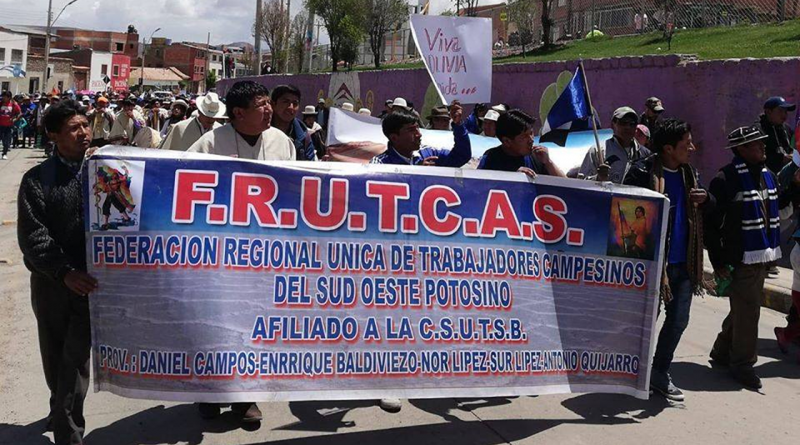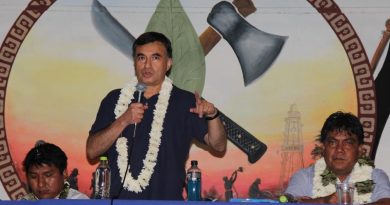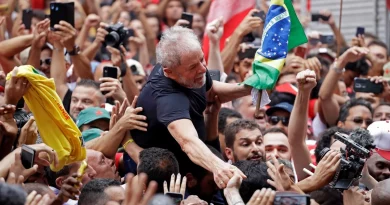The Fight To Save Bolivia’s Lithium
In an exclusive interview for Kawsachun News, union leader Ramiro Huayta reveals how Bolivia’s lithium is being surrendered to foreign capital, and what the social movements in the town of Uyuni are doing to defend the natural resource that lies in their territory. Ramiro is the leader of the Federación Regional Única de Trabajadores Campesinos del Altiplano Sud (FRUTCAS), the campesino workers’ union that covers Uyuni.
Bolivia has the world’s largest known reserves of lithium, which is set to become one of the world’s most important natural resources as manufacturers seek it out for use in batteries for electric cars, computers, and industrial equipment.
The US-backed coup in November came just as Bolivia was beginning to industrialize the processing of value-added final products, under the nationalized company, YLB.
The new regime has already announced that they plan to invite numerous multinationals into the Salar de Uyuni, the vast salt flats in Potosi that hold the precious soft metal. Añez’s VP candidate, Samuel Doria Medina, went as far as inviting Elon Musk (over Twitter) to come and exploit the Salar, and establish a lithium battery factory for Tesla cars. Elon Musk did not tweet back.
The plan under Evo Morales’ government was to process the lithium within Bolivia, rather than just exporting the raw material to the factories of the global north. It would have broken the neocolonial relationship in which Latin American countries often have to buy back the refined end product of their own raw materials.
Similar efforts are being made in Mexico, where AMLO’s government is pushing for more oil refineries, to end the absurd situation in which Mexico ships crude to the U.S., only to have to buy it back from them as a refined product at a much higher price.
Progress was being made in Bolivia. The state company YLB had already begun producing batteries, and even it’s first electric car. This was done in partnership with German company ACISA, in a deal in which the Bolivian state kept majority control.
That agreement has now been scrapped, following the coup. However, the people of Uyuni are steadfastly opposed to this ongoing privatization and are organizing to stop foreign capital from, once again, looting Bolivia’s natural resources.
Ramiro Huayta’s union, FRUTCAS: Periodico el Universitario
Oliver Vargas (OV) | What are the threats to Bolivia’s lithium under this regime?
Ramiro Huayta (RH) | The first issue is that the entire project [industrialization of lithium] is now completely paralyzed.
So that means that all aspects of the original plan have fallen apart. The other threat is the announcement from the Minister of Economy and Finance, on April 23rd, at an Economic Forum in Santa Cruz. He said that in order to attract investment in lithium, two or three foreign companies will have to be called upon, supposedly to inject resources. This is a threat, and it’s also unconstitutional, because our constitution, and the law in regards to lithium, prohibits natural resources from simply being handed over.
So, this announcement made us realize that they intend to intervene in an underhand way, in the lithium issue, with a view to privatizing it. That is a very serious threat.
OV | What about the deal with the German company, under Evo Morales? Did that give Bolivia sovereignty over its lithium?
Well, everything to do with extraction and basic production was set to be done 100% under Bolivia’s state company. It was for the processing and industrialization of the lithium, such as the manufacturing of batteries, that this foreign, German company was brought in, because obviously, Bolivia needs the expertise and investment to be able to do this within the country and to be able to sell it internationally. This deal was beneficial because it still gave Bolivia majority control over the process, though of course, we still think that there were parts of the deal that could’ve been improved and corrected.
But now, Bolivia is in a very difficult situation, because the government has canceled the deal, but they don’t know what to do with the lithium. I don’t think the Germans are going to sit there with their arms crossed. We think that they’re probably waiting for this government to leave so that they can re-establish their deal, if not, they’ll probably take Bolivia to an international court for violating an agreed contract.
The Uyuni salt flats: salardeuyuni.es
OV | Do you think the coup took place, primarily, to stop Bolivia industrializing its own Lithium?
RH | Yes absolutely, also, the whole situation in regards to lithium has been kept very hidden. As you know, COMCIPO (Comite Civico Potosinista, a right-wing protest group led by prominent coup leader Marco Pumari) began trying to manage this situation even before the coup. But yes, deep down, the coup has always had the intention of intervening in the issue of lithium. COMCIPO provided some of the personnel for this, such as Juan Carlos Zuleta, who was COMCIPO’s advisor before the coup and then became the new director of YLB (state Lithium company) under Añez. They’ve always tried to make a move for the lithium reserves, or at least to negotiate something for themselves because out of the entire ‘lithium triangle’ in South America, Bolivia has the most lithium. Argentina and Chile have some but in much smaller quantities.
So of course, lithium has everything to do with the coup that took place, we still don’t know exactly what their plan is, or who it’ll be sold to. However, on the Bolivian side, the Potosi coup leaders have always been trying to get their share, for their own personal benefits, not for the Bolivian people.
OV | So is that why Marco Pumari initiated those protests in Potosi, both before and after the election that Evo Morales won?
Marco Pumari (left) with fellow coup leader Fernando Camacho: Los Tiempos
RH | Firstly, they focussed on one part of the contract with ACISA, the part that stipulated that the partnership would last for 70 years. They manipulated this point and portrayed it as something extremely negative, which then caused a great deal of anger amongst some in the city of Potosi and in many parts of Bolivia.
Then they also started talking about the issue of royalties and how much of the revenue Potosi would get from the deal.
So it was these two points that were used as a pretext to intervene, knowing all along who they wanted to place in a position of management within YLB. T that person is Juan Carlos Zuleta, a former COMCIPO staffer.
Their plan was always to overthrow the government, so as to clear the way for their own business dealings. However, they’ve actually failed in this now, because they’ve already fallen out with the government [Marco Pumari is now running against Añez as Fernando Camacho’s VP candidate]
When COMCIPO began falling out with Añez, Mr. Zuleta was fired, and the government replaced him with their own person, Mr. Valda, who isn’t tied to COMCIPO. So we can see that there’s an internal fight within the right about who exactly gets to control the lithium. While the right-wing fight over this, the project to industrialize lithium has been abandoned.
OV | After all this, does Pumari, as Camacho’s VP candidate, have much popular support left in Potosi?
RH | Well, up until the coup, they did manage to win some level of support within the department. However, we were pleased to see how quickly that disappeared, as lots of information was revealed about how his people were trying to negotiate corrupt deals and benefits for themselves within the new government. That disappointed a lot of people, and so now the situation has flipped. The people that supported Pumari no longer support what’s going on, especially with the worsening social conditions in Bolivia, along with the repression and threats against those who criticize the government. People here are realizing that the last government wasn’t as bad as they used to believe, and they’re realising that this government is worse.
In Bolivia now, the people, and especially the campesinos, are persecuted. Meanwhile, the upper class gets all the benefits and privileges. That class difference is now a lot clearer.
OV |Thank you. To finish, are people in Uyuni fighting back against the attempt to privatize Bolivia’s lithium?
RH | Yes, the people of Uyuni went out to protest when the then Director, Juan Carlos Zuleta, came to visit. We went to the airport to try and stop him from getting into Uyuni. He had to hide inside the airport for a while but then got out by the back door, escorted by police. This sort of behavior shows us that the current government doesn’t want to work with the social organizations of Uyuni, they want to impose something by force.
The union I lead has always opposed what’s going on and opposed the changes being made to the state company YLB. Also, the Juntas Vecinales (neighborhood organizations) in Uyuni are also coming out to protest against privatization. We know exactly what’s going on. Our demands are: first, the reactivation of the industrialization project; secondly, a general law to establish how the state company is run.



